Movement in the City, Melrose Park, Suffers Fire
A fire briefly burned in Movement in the City’s (new faith community) Melrose Park campus this morning. Firefighters, who rushed from a nearby station, quickly extinguished the…
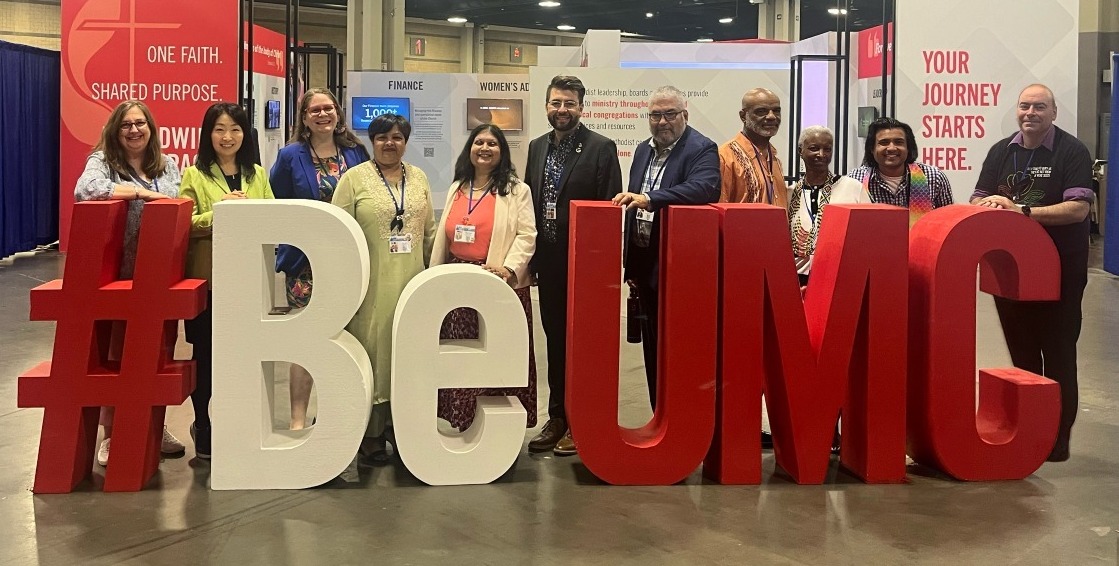
If you have attended or viewed a United Methodist General Conference over the past 24 years, you might have some painful memories of pervasive distrust, mean-spirited (or simply mind-numbing) debate, political machinations, hurt, and anger. Oases of relief came only during inspiring worship and catching up with old friends.
Now imagine discussions about legislation that was mutually respectful, even among people who disagreed. Delegates dancing and singing the O'Jays' "Love Train" when they returned from a break. Exuberant hymn-singing when a Spirit-led joy filled delegates and observers. Yes, this was the 2020/2024 General Conference.
Now, to summarize some of Friday's significant actions.
General Conference voted to reduce the number of bishops across the U.S. from 39 to 32 for the 2025-2028 quadrennium. This leaves the North Central Jurisdiction to decide how to reduce the number of its bishops from seven to six.
Two NCJ bishops are retiring this year: Bishops Gregory Vaughn Palmer and Julius Trimble. These reductions were dealt with by the NCJ’s establishing two new episcopal areas that would each encompass two annual conferences. Northern Illinois and Wisconsin Conferences will be overseen by the same bishop and East Ohio and West Ohio Conferences will be overseen by the same bishop, starting on Sept. 1.
Because no addition bishops in NCJ are expected to retire this year, our jurisdiction can entertain the option of identifying an NCJ bishop willing to move to a jurisdiction that will need another bishop.
The denominational budget for 2025-2028 is $373.4 million, a drop of 38 to 41 percent from the budget passed in 2016. COVID and disaffiliations had much to do with an anticipated drop in apportionment receipts.
That budget is contingent on collection rates' coming to 90 percent or more for the next two years. If giving is below that percentage, the budget bottom line will drop to $353.6 million.
Annual conferences will be asked to pay less to support denomination-wide ministries.
Delegates took a moment to apologize, on behalf of the UMC, to victims/survivors of clergy sexual abuse. "The United Methodist Church apologizes for the times we allowed our desire to protect the Church to outweigh our desire to care for victims and survivors of sexual misconduct. We have allowed polity and protection of the institutional Church prevent us from holding persons accountable, thus perpetuating harm within our local churches and other ministry settings, and damaging the whole United Methodist connection," the statement read in part. It includes four pledges for the church to act upon to prevent future abuse.
One amendment addresses racism. It adds to Article V: "The United Methodist Church commits to confronting and eliminating all forms of racism, racial inequity, colonialism, white privilege, and white supremacy, in every facet of its life and in society at large." It also updates the definition of racism now in the constitution.
Another adds to ¶ 4. Article IV, the words gender and ability: "Inclusiveness of the Church—The United Methodist Church is a part of the church universal, which is one body in Christ. The United Methodist Church acknowledges that all persons are of sacred worth. All persons without regard to race, gender, ability, color, national origin, status, or economic condition . . ."
Just as with the two constitutional amendments related to regionalization, these will need a two-thirds majority of all votes taken at all the annual conferences.
The majority of legislation supported by climate justice activists within The United Methodist Church was passed by General Conference on the consent calendar in the early part of its second week.
But they were unable to get General Conference to require that United Methodist institutions, including Wespath—the denomination’s pension and benefits agency—divest from fossil fuel company stocks.
The consent calendar allows delegates at the lawmaking assembly to pass multiple petitions in bulk if they have overwhelming support in legislative committee and have no budgetary or constitutional impact.
“We are in excellent shape to take the creation justice movement to every annual conference and local church in the denomination,” said the Rev. Nancy Blade, co-chair of the Northern Illinois Conference Eco-Sustainability Task Force.
Blade said that nearly every one of the petitions passed on the first two consent calendars, April 29 and 30. Two more, which had amendments, passed on the May 1 consent calendar.
“These legislative tweaks and informational resolutions will bring structure to the ministry of creation care. Now everyone needs to do their part and get behind local green teams and community projects,” she said.
Read Neill Caldwell and Sam Hodges's report
NIC clergy Rev. Mary Lou Eubanks (French) and Rev. Victor Melad (Tagalog) served as translators during proceedings. Read what translating a multi-lingual conference is like.
General Conference adjourned at 6:30 p.m. (ET)
Deacons now may preside at the sacraments of communion and baptism without needing a bishop's permission. The new language in the Book of Discipline reads, "Deacons give leadership in the Church’s life: in teaching and proclaiming the Word; in contributing to worship, in assisting the elders in administering the sacraments of baptism and Holy Communion, or in presiding at the celebration of the sacraments when contextually appropriate. . . . For the sake of extending the mission and ministry of the church and offering the means of grace to the world, the deacon is authorized to preside at the celebration of the sacraments. Presiding at the celebration of the sacraments involves taking responsibility to lead the gathered community in celebrating baptism and Holy Communion."
The New Federation of Asian American United Methodists announced that they applaud the General Conference's removing harmful language aimed at LGBTQIAA+ community members. "We celebrate the expansion of the Lord’s table to embrace more individuals," the statement reads. "Despite diverse theological perspectives among Asian American siblings, we deeply cherish, respect, and honor each other as unique reflections of God. Our collective diversity enriches our spiritual tapestry." NIC's Rev. Scort Christy is the president of the organization.
This afternoon delegates passed the remaining section of the Revised Social Principles, "The Social Community." The revision was 12 years in the making. The process included engagement from thousands of United Methodists around the world.
This section was the only one amended on the plenary floor: The first sentence on marriage was changed to "Within the church, we affirm marriage as a sacred lifelong covenant that brings two people of faith, an adult man and woman of consenting age, or two adult persons of consenting age into union with one another and into deeper relationship with God and the religious community." This amendment clarifies that both partners must be old enough to consent to the marriage, an important point in some cultures.
Read more about the Social Principles
A new retirement plan for UM clergy in the U.S. won overwhelmingly approval from delegates. Wespath, the denomination’s pension and benefits agency, proposed Compass, a defined-contribution plan. Instead of a defined monthly pension amount, Compass will operate more like a 401(k), which are offered by most corporate employers. Wespath leaders said the denomination’s steady numerical decline over many years required a new, sustainable approach to supporting retired clergy.
Bishops' responses to ordination vote
Bishop Dan Schwerin celebrated the lifting of the prohibition of ordaining gay people. Some bishops were more hesitant because the dominant number of conservative churches in their conferences. Their tone and points of emphasis have varied.
Repeal of ordination ban on consent calendar
The most remarkable act of General Conference so far this week was the delegates’ removal of prohibitions related to LGBTQ people. In one vote, General Conference lifted the ban against the ordination of “self-avowed, practicing homosexuals,” approved the protection of clergy or churches who chose (or chose not to) officiate or host same-sex weddings, and urged bishops to pursue inclusivity of gender, race, ethnicity, age, people with disabilities, sexual orientation, and economic condition in naming representatives to ecumenical organizations.
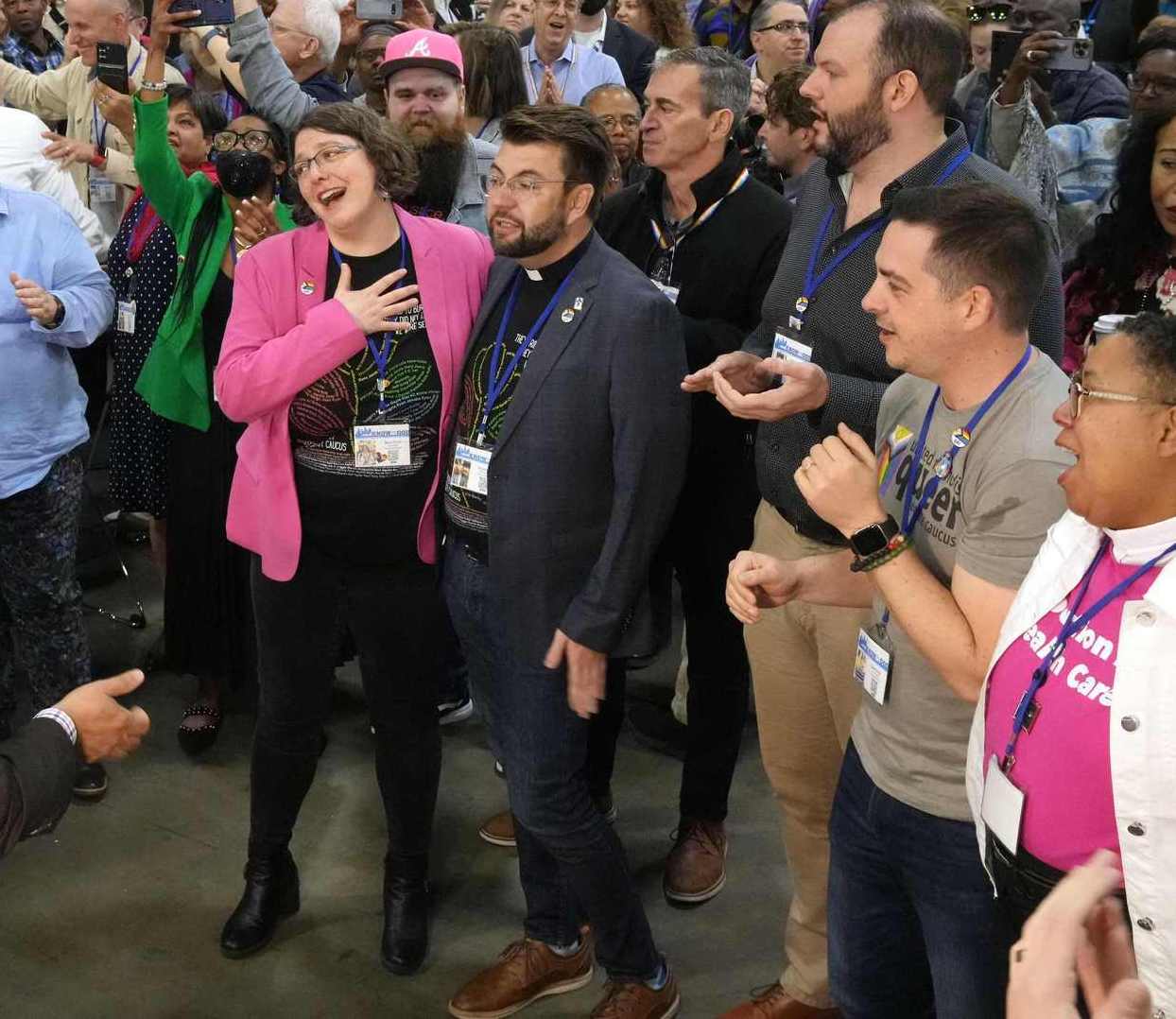
Rev. Gregory Gross (center) joins in the celebrations after the prohibition against ordaining LGBTQ people is revoked.
This took only one vote because these proposed legislative items (“petitions”) were bundled into a calendar item, allowing delegates to vote on all of them at once.
The joy these decisions made filled the convention center with cheers, shouts, and sobs. Many marched to a fountain outside of the building and sang together.
As always, United Methodist clergy continue to have the right to conduct weddings of couples at their own discretion. The same continues to be true for church policies related to weddings.
The NIC Cabinet will continue to appoint clergy to churches where there is a good fit and best likelihood for mutually fruitful ministry. Churches that are not ready to accept a gay pastor will not be obligated to receive one.
Watch a video with immediate reactions from Northern Illinois people
Read the UM New story by Heather Hahn
Regionalization
The last legislative item needed for the regionalization plan passed today. Next, members of annual conference sessions will vote on a constitutional amendment that make the plan possible. Two-thirds of all of these votes are needed to ratify the amendment. Some annual conferences may vote on it this year.
Northern Illinois pastor leads UMC to condemn persecution in India
Persecution of Christians in India has taken lives, says the New Federation of Asian American United Methodists, and their resolution condemning this violence and calling for direct action passed with overwhelming support.
“Too often, we mourn the loss of lives after a terrible tragedy has taken place,” said Rev. Scort Christy, a Northern Illinois clergyperson and president of the NFAAUM. “This petition is an urgent plea to be proactive and to prevent the atrocious acts of persecution of Christians in India.”
“Since May 2023, due to violence against Christians in the North East State of Manipur, India, 120 people have been killed, more than 250 churches and 1,700 houses have been destroyed, and 40,000 people have fled to neighboring states, some to Myanmar, the neighboring country,” the resolution explains. “Manipur’s state government is led by India’s Hindu Nationalist ruling Bharatiya Janatha Party (BJP). Religious minorities such as Christians and Muslims live under constant fear and threat in India, the largest democracy in the world.”
The petition urges American United Methodists to contact their congressional representatives, asking them to inform the House Foreign Affairs Committee and the State Department of the human-rights violations committed against religious minorities in India.
Read the UM News Service story by Gladys P. Mangiduyos
Disaffiliations are done
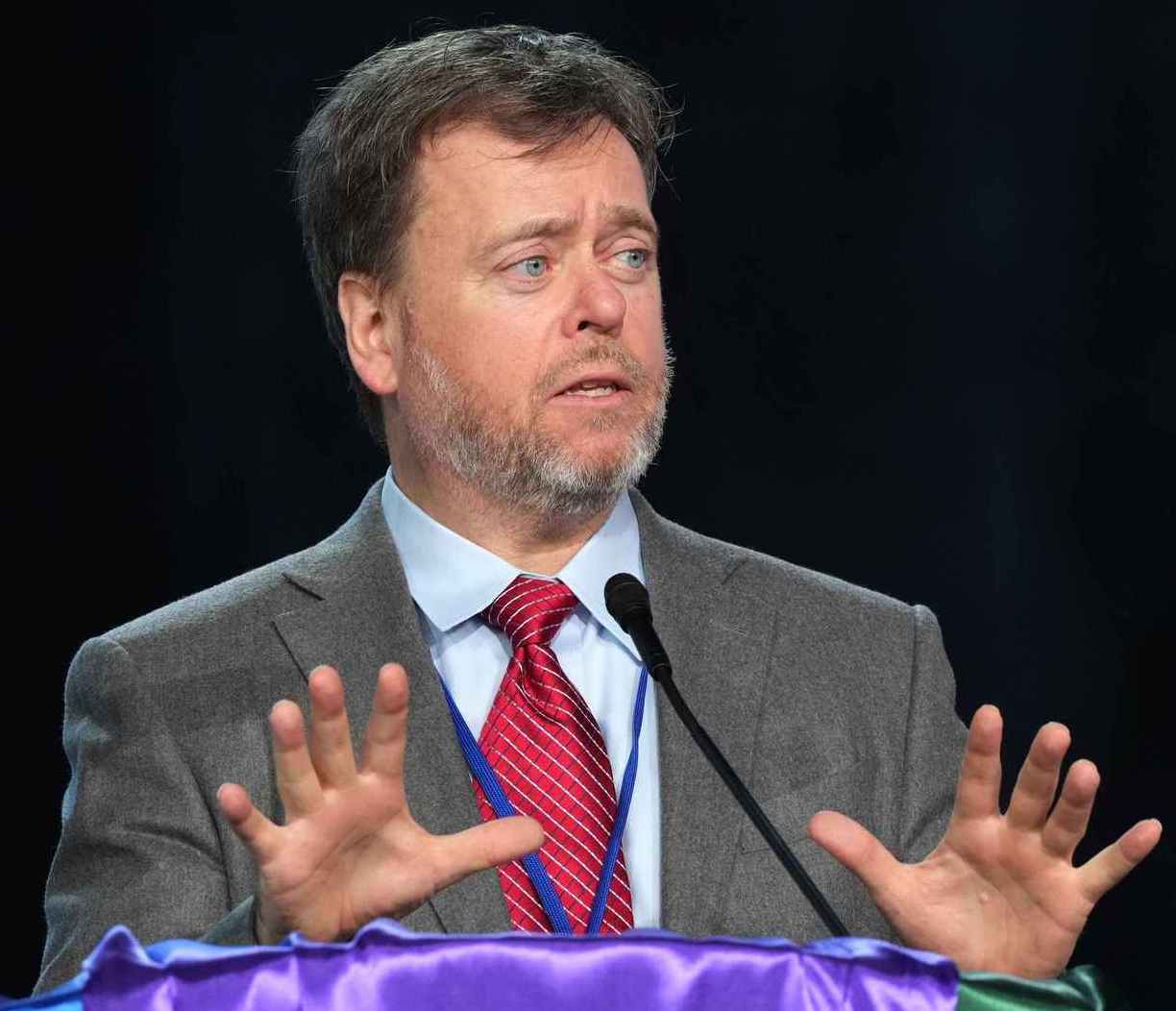
Lonnie Chafin introduces legislation to the plenary.
General Conference firmly closed the door on church disaffiliations by repealing Disciplinary paragraph 2553. That provision, introduced at the 2019 special session of General Conference, gave churches a way to leave the denomination with their property and after fulfilling annual conference obligations “for reasons of conscience.” The option ended on Dec. 31, 2023, and delegates agreed not to renew it.
Introducing the Conferences Legislative Committee’s recommendation not to extend the process, committee chairperson and Northern Illinois lay delegate Lonnie Chafin said, “Congregations have been in conflict. Conferences have had to divert attention away from our mission and spend considerable time and energy on disaffiliations.”
A separate petition passed later encourages conferences to devise policies for welcoming back those churches who had disaffiliated but later changed their minds.
“Congregations have been in conflict,” he said. “Conferences have had to divert attention away from our mission and spend considerable time and energy on disaffiliations.”
Read the UM News story by Heather Hahn
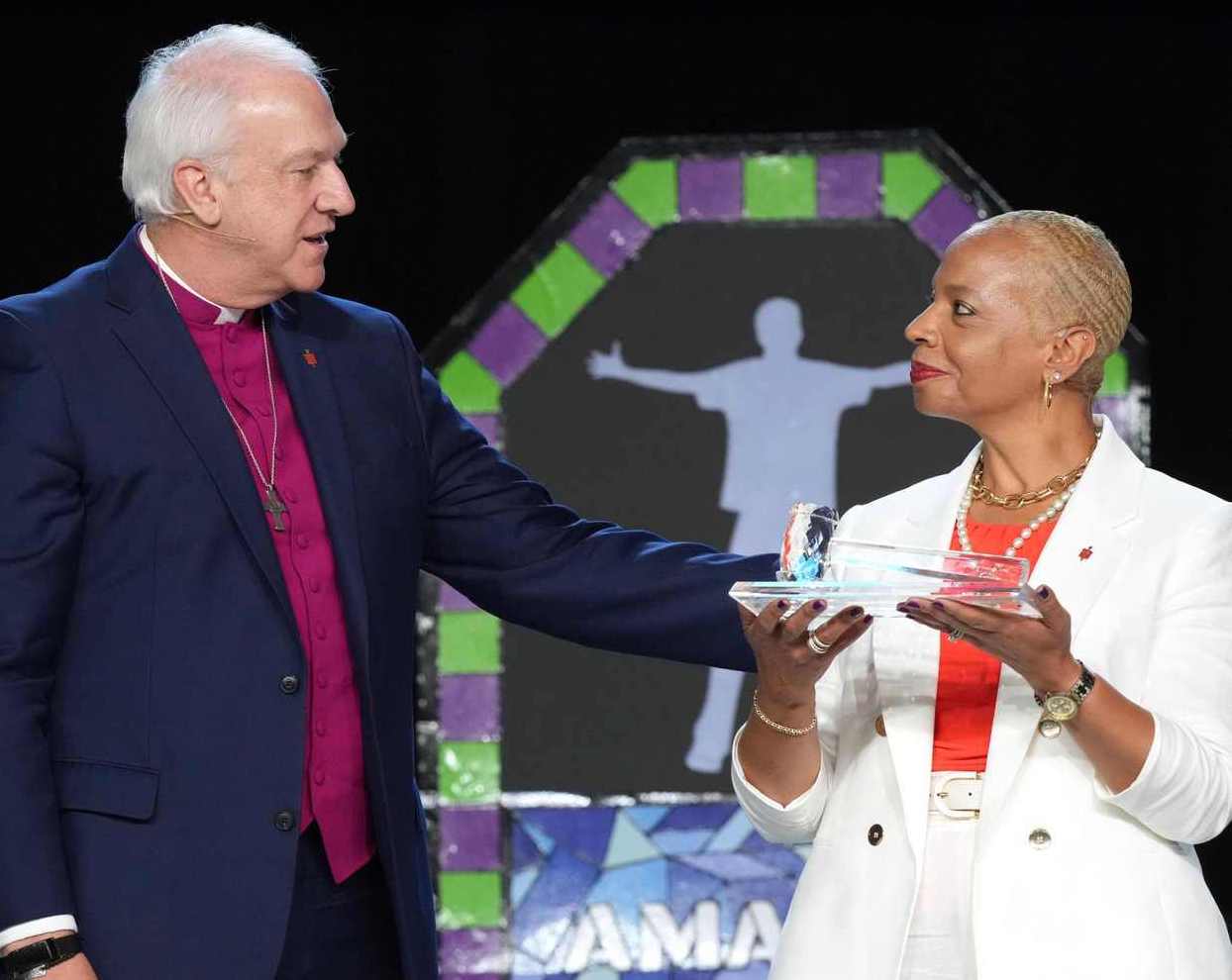
Bishop Tracy Smith Malone assumes Council of Bishops presidency
Bishop Thomas Bickerton, the council’s outgoing president, offered Bishop Malone a crystal gavel as he introduced her as the council’s new president on April 30. Bishop Malone is the first black woman to hold that post.
Barbara Sutton of Maple Park UMC consecrated as deaconess
Northern Illinois's Barbara Sutton was consecrate a deaconess on April 29. Deaconesses and home missioners are laypeople who are called by God to be in a lifetime relationship in the UMC for engagement with a full-time vocation in ministries of love, justice, and service. They form a covenant community that is rooted in Scripture, informed by history, driven by mission, ecumenical in scope, and global in outreach. Their community dates back to the late 19th century. (Deacons are clergy who are ordained to word, service, compassion, and justice.) Congratulations, Barbara!
LGBTQ prohibitions fading
Delegates repealed a number of restrictions on LBTQ people and their allies. So far, delegates passed measures that:
Remove a ban on annual conferences and denominational agencies from giving UM funds to any “gay caucus group” or using funds to “promote the acceptance of homosexuality.” Instead, the provision now says annual conferences and agencies should honor the denomination’s already stated commitment not to reject lesbian or gay members.
Eliminate the requirement that the General Council on Finance and Administration, the denomination’s finance agency, enforce the ban. Instead, delegates flipped the provision, calling the agency to be sure that church funds do not support anything that rejects LGBTQ people or limits the response to the HIV epidemic.
Strike the ban on boards of ordained ministry from even considering candidates who are “self-avowed practicing” gay people and drop the requirement that bishops rule gay candidates for ordination ineligible.
Eliminate the mandatory penalty of at least a one-year suspension without pay for clergy found guilty of officiating at same-sex weddings or unions. (This was the denomination’s only chargeable offense with a mandatory penalty.)
Allow gay clergy in good standing to be appointed across annual conference lines when their bishop can’t locate an appointment in their conference.
Set a moratorium on judicial proceedings related to the denomination’s bans against “self-avowed practicing” gay clergy and same-sex weddings. The moratorium will last until General Conference alters it.
Read the UM News Service story by Heather Hahn
Apportionment base rate lowered
Delegates reduced a key component of calculating apportionments, the portion of church giving requested to fund the general-church budget. They lowered the current base rate, 3.29%, to 2.6% for 2025 and 2026. If the apportionment collection rate reaches at least 90% in those years, the base rate will rise to 2.9% for 2027 and 2028.
Increasingly generous apportionment giving results in more communications training for churches, more quality Bible study and faith formation resources that follow Wesleyan principles, more lives improved and empowered through mission work in all parts of the world, and many other resources and opportunities for loving God and neighbor.
Additional regionalization items approved
Delegates agreed with the recommendation of a legislative committee (chaired by NIC's Lonnie Chafin) to name a committee to devise a plan of organization for a U.S. regional conference. Previously passed legislation identifies the UMC in the U.S. as a regional conference, on the same footing as what were called "central conferences" in other nations.
Revised Social Principles progress
Adopted on April 30: Preamble; ¶160, The Community of All Creation; and
¶163, The Economic Community. This adds to portions already passed: The Political Community and the Preface. Still awaiting conference action: The Social Community.
Read the Revised Social Principles
Full communion with The Episcopal Church endorsed
A long-awaited full communion relationship with The Episcopal Church received delegates' enthusiastic support, inspiring a standing ovation when the positive tally was announced.
The next step toward completing the agreement requires Episcopal Church action. The Episcopal Church may not act on it until its 2027 General Convention. Though that church holds a General Convention this summer, it may be too late to include the agreement on this year's agenda.
The two churches share a historical ancestor, the Church of England. Charles and John Wesley, both Anglican priests, are commemorated in the Episcopal calendar on March 3.
The UMC already has a full-communion agreement with the Evangelical Lutheran Church in America. This entails a mutual understanding, respect, and recognition of the sacraments of baptism and communion as well as an understanding of ordination. Our churches may worship together, exchange clergy, and share commitments to evangelism and service.
Further, delegates renewed the UMC's full-communion relationship with the northern and southern provinces of the Moravian Church. Members of the Moravian Church greatly influenced John Wesley's faith and discipleship.
Read Jim Patterson's UM News Service story
Portions of Revised Social Principles approved so far
The United Methodist Church now proclaims its support “for the equal rights, liberties, and protections of all people, regardless of sexual orientation or gender identity.”
On April 26, General Conference delegates approved that statement as part of the first batch of revised Social Principles to come before the body.
General Conference has passed revised Social Principles dealing with “Church and Governments” and “Basic Rights and Freedoms” — alongside nine other pieces of legislation — on the consent calendar.
A portion of this reads, "Because all people are of sacred worth and certain basic human rights are due to everyone, we are committed to supporting the equal rights, liberties and protections of all people,
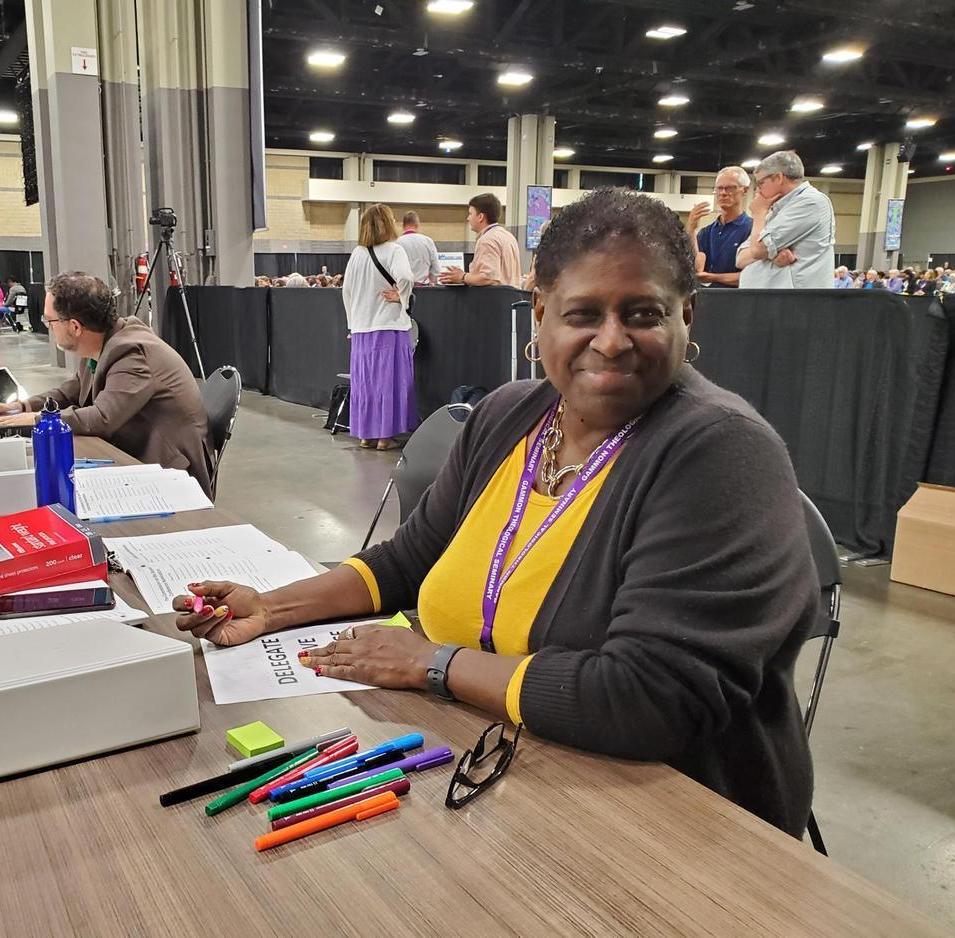
Rev. Danita Anderson checks credentials of first delegates and alternates.
regardless of sexual orientation or gender identity."
Then on April 29, delegates supported two additional sections. One, "Government Responsibilities: Church and Governments," includes, "Though the formal relationships between religious communities and governments vary from country to country, we generally affirm the independence and integrity of both institutions . . . We affirm that every form of government stands under God’s judgment and must therefore be held accountable for protecting the innocent, guaranteeing basic freedoms and liberties, protecting the natural world, and establishing just, equitable, and sustainable economies."
The second portion approved, "Basic Rights and Freedoms," includes, "[B]asic rights and freedoms include the right to life, liberty, and security as well as to equal treatment before the law and freedom from unlawful detention. Additional liberties include the rights to fair trial, privacy, public assembly, free expression, democracy, food and shelter. Further, workers have rights to engage in collective bargaining, receive just compensation and work in safe, healthy environments."
The UMC and its predecessors have long taken public stands on issues of the world going back to the 1908 Social Creed, which called for “equal rights and complete justice for all men in all stations of life.”
Read the UM News Service story by Heather Hahn
More regionalization items approved
Delegates approved two more items related to regionalization. These relate to the number of bishops who will serve what are now called the central conferences in Africa and which ones might be sharing a bishop.
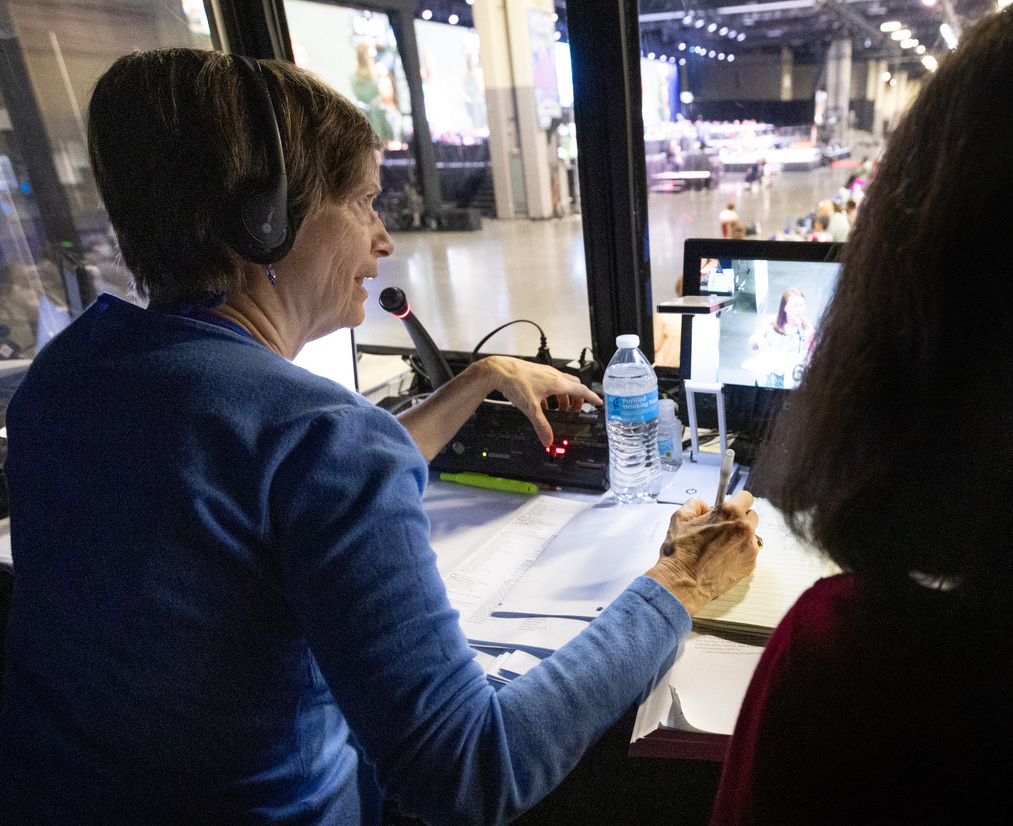
NIC's Mary Lou Eubanks translates for French speakers at General Conference.
Bishop Harald Rückert, who oversees the Germany Area and is a member of the Standing Committee on Central Conference Affairs, explained that this legislation provides the African central conferences two more bishops. Those conferences may decide how they will assign the bishops and which conferences may be assigned to share a bishop.
Some African delegates expressed dissatisfaction, because in 2016, the General Conference authorized the standing committee to develop a comprehensive plan to add five bishops to the African continent.
Read UM News story by Heather Hahn
Church apologizes for role in Hawaiian history
Hawaiian United Methodists are cheering the decision by General Conference to approve a formal apology for the denomination’s role in the overthrow of the 1893 Hawaiian monarchy.
“I am ecstatic, just thrilled after so many years of waiting for this to finally happen,” said the Rev. Amy Wake, pastor of Trinity UMC in Pearl City, Hawaii. “It means we can go back to [Native] Hawaiians and tell them the UMC has heard you and is with you.”
The apology petition was supported overwhelmingly in committee and gained final approval on April 29. The petition calls for the California-Pacific Conference Hawaii Acts of Repentance Task Force to work with the UM Commission on Religion and Race on the official apology.
In approving the legislation, delegates acknowledged a “history of racism and imposed colonial rule” that continues to hold back Native Hawaiians.
Read UM News story by Sam Hodges
More information about absent delegates
Earlier in the conference, delegates asked conference secretary Gary Graves to provide a report outlining the specific reasons some elected delegates had trouble obtaining visas and could not make it to General Conference. Though the Committee on Credentials investigated this and reported being satisfied that Graves did everything possible to resolve these problems, delegates asked for a more detailed report.
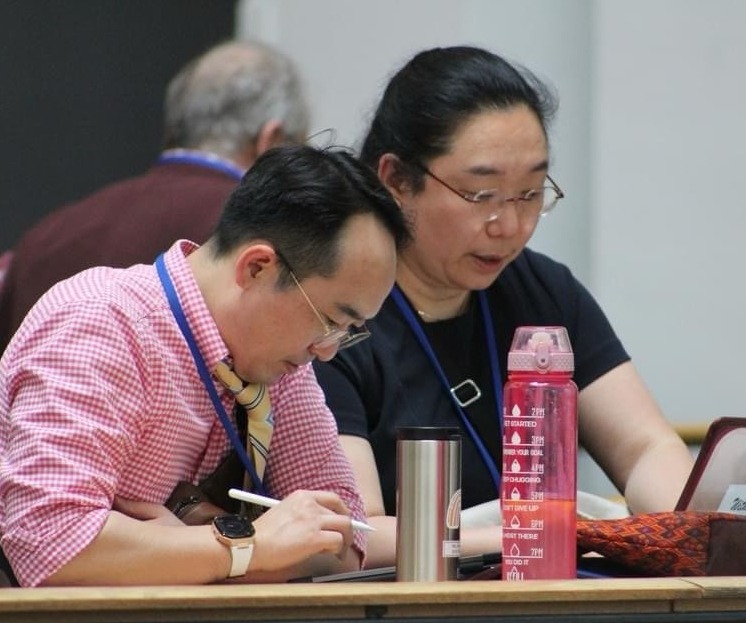
Paul (left) and Rosa Lee served as leaders of marshals and pages and worked out assignments.
Diane Brown of the Credentials Committee brought a thorough report on April 29. Among other points, she explained that the credentialing process began in 2017 and they used the formula required by the Discipline and data from the General Council on Finance and Administration. Receiving certificates of election from some central conferences was fraught with problems. In some cases, the name of the conference secretary was unknown, or more than one person claimed to the secretary. Some sent more than one list and these were not consistent. In some cases the lists did not complete the four categories of election. The conference secretary's staff turned to conference journals (those they had copies of) to verify names of elected delegates. There were also some fraudulent “invitations” to General Conference which some used to get visas.
Brown reminded delegates that only the government can rule on whether to provide visas. The church has no influence on that process.
Ultimately, Brown said, 75 percent of the central conference delegation has been badged. A few more are expected to arrive. Some delegations will not arrive because their conference did not elect alternates and the first elected were not available. In some cases, the commission members never received word from a delegation about their plans to participate.
Keep in your prayers
Delegates learned in the afternoon that a shooting had occurred in Charlotte (though not near the convention center) and took a moment to pray. According to CNN, four officers were killed in a shooting while attempting to serve a warrant at a home in Charlotte, including one deputy U.S. marshal and two local task force officers.
Rally for Palestinian safety
Concern for Palestinians during the Israel/Hamas war led over 100 people at General Conference to gather for a peaceful demonstration on April 25.
Sponsored by UM Kairos Response, the rally drew delegates and observers— along with at least six bishops— to hear from a variety of speakers and sing hymns in solidarity.
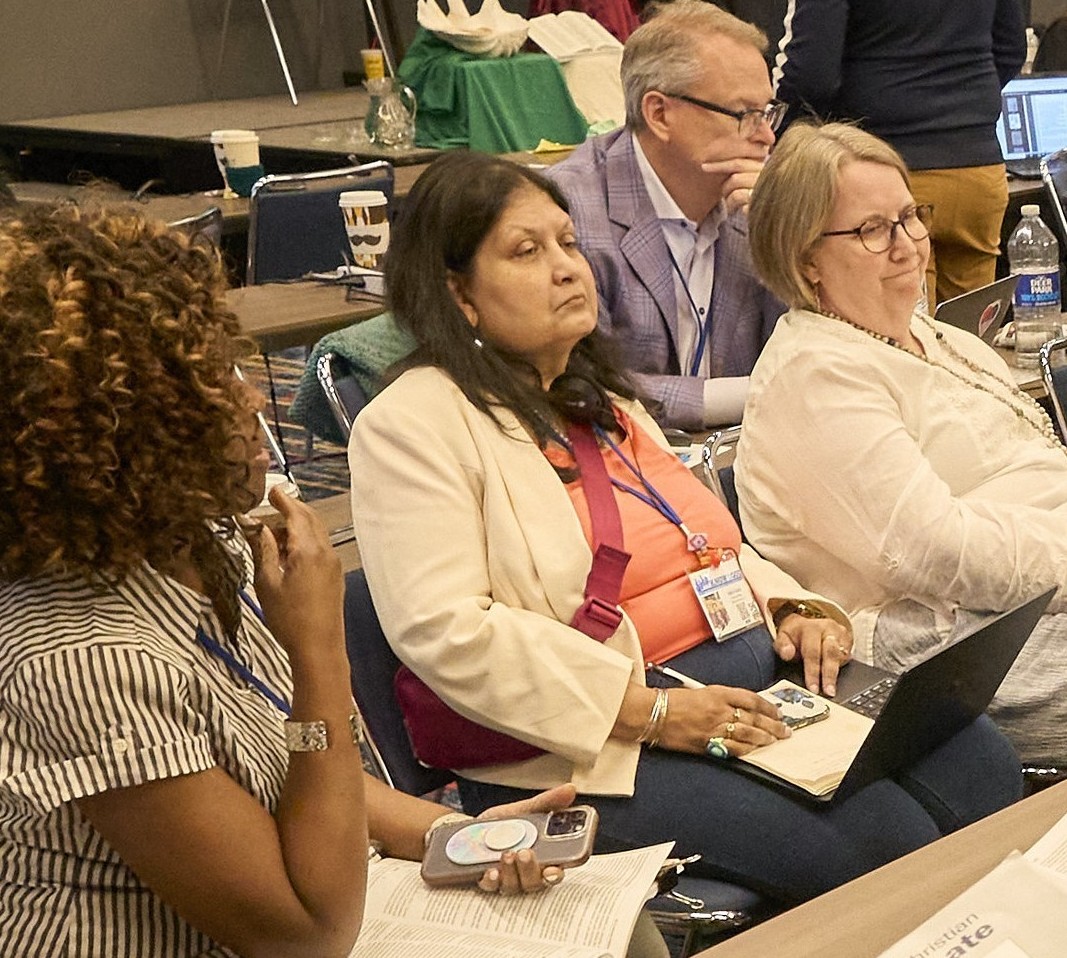
NIC delegate Nadia Kanhai considers petitions in her legislative committee.
In March, the UM Council of Bishops called for a ceasefire in the region. The UMC has opposed Israel’s occupation of Palestinian lands since 1976.
Thomas Kemper, former general secretary of the UM Board of Global Ministries, said he returned two weeks ago from a visit to the occupied West Bank.
“I joined the rally as our Christian sisters and brothers in Palestine have called us to cry out for them as their lives are threatened and their future is being destroyed. . . . There needs to be a future in peace for both peoples: Israelis and Palestinians," he said.
Rev. Scort Christy speaks about image of persecution
Yesterday we reported that the New Federation of Asian American United Methodists, led by NIC’s Rev. Scort Christy, expressed their alarm that one of the images projected on screens at General Conference was a yoga symbol.
The caucus group explained that the current Hindu Nationalist government uses this image as part of their campaign to provoke Hindu followers to persecute religious minorities such as Christians, Muslims, and Sikhs.
"As the President of NFAAUM, I know that the symbol of the particular yoga posture is a Padmasana affront to Indian Christians," Rev. Christy told us today. "That symbol represents the deep wounds inflicted on our communities by Hindu Nationalists. Someone remarked, 'It is like walking into a Hindu temple at the General Conference.'
"I am all for interfaith relations. I am all against the 'religionization of politics and politicization of religions.'”
What are young adult UMs feeling?
Churches wanting to strengthen their ministry with young adults need to first understand the challenges they face.
Chris Wilterdink, director of Young People’s Ministries for UM Discipleship Ministries, says that economic pressures, the cost of living—especially housing— continue to rise, while unemployment and wage growth continue to be difficult to navigate. Older generations continue to work longer and delay retirement, limiting the opportunities for young people to grow professionally.
Some young people have delayed or opted out of pursuing theological education or beginning the process of becoming clergy because they doubt there will be churches or an organization that can provide a job or a living wage upon completion of their process, he said.
He also noted that some young people were not provided with adequate information or access to voting during local church disaffiliation processes, resulting in a sense of disenfranchisement.
Fewer young adults are serving as delegates at this year's General Conference, in part because some of them aged out of young adulthood since they were elected over eight years ago.
Read about the Young People's Address
Coming up Saturday
Consent calendar items are expected to appear on the agenda for vote in the morning. Legislative committees will continue in the afternoon. Delegates will get a much-needed day of rest on Sunday.
Regionalization passes
Two of four petitions that make regionalization possible gained approval from General Conference delegates.
The first measure to pass named the regional conferences and the countries they will comprise. The second amends the UMC constitution to allow each regional conference amend the General Book of Discipline for their contexts. This can include:
Constitutional amendments approved at General Conference next go to
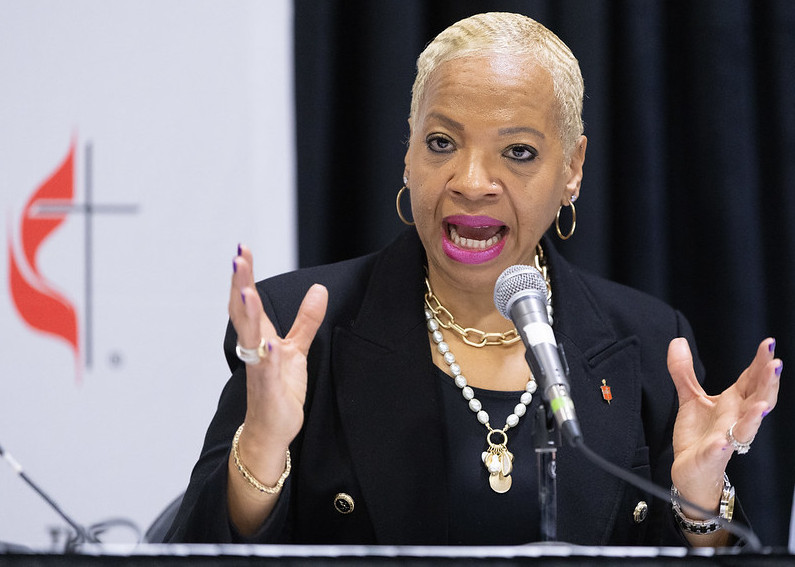
Bishop Tracy Smith Malone, who presided when delegates voted on two of four petitions related regionalization, speaks during a press conference. Photo by Mike DuBose, UM News.
annual conferences for ratification. At least two-thirds of the total of all votes is needed for ratification.
“The passage of the first petitions facilitating worldwide regionalization is a great first step towards and provides hope for the passages of the remaining parts," said Rev. Gregory Gross, a deacon and an NIC delegate to General Conference. "In total, worldwide regionalization will make significant progress in our work of decolonization of The United Methodist Church.”
The regionalization plan was developed by of multiple United Methodists around the globe. The new structure will allow each of the four regional conferences to establish policies and procedures that fit their own contexts, without enjoining United Methodists in other regions.
Up to this point, much of the Book of Discipline related mostly the U.S. context. United Methodists around the world voted on whether to approve amendments but did not need to live by them. Central Conferences were able to adapt the Book of Discipline for their own contexts.
All regions are required to retain in their Disciplines the Articles of Religion and Confession of Faith.
The earliest central conferences date to the 1880s, and efforts at regionalization date back to the 1920s, but they never succeeded.
Revised Social Principles moves out of committee unchanged
Late in the day, the Church and Society 2 Committee approved the Revised Social Principles by a strong vote of 41 to 15. They recommended no changes. The legislation goes to plenary, where debate and efforts to amend are expected.
Thursdays in Black
Today (April 25), General Conference observed Thursdays in Black. This initiative of the World Council of Churches encourages people to wear black every Thursday to acknowledge violence against women around the world and to vow to end the church’s silence and inaction. An estimated 736 million women — almost one in three — around the globe have experienced physical and/or sexual intimate partner violence, non-partner sexual violence, or both, at least once in their life, according to UM News Service.
Bishop LaTrelle Miller Easterling, episcopal leader of the Baltimore-Washington and Peninsula-Delaware annual conferences, had endured domestic violence in a previous marriage.
Preaching on Thursday morning, she stood before General Conference on Thursday morning and testified to the damage the church can do when it is silent on this issue.
To the church, Bishop Easterling said, “Stop making us invisible! Speak our names! Minister to us and speak words of hope and health and healing, and holistic sacredness into our lives.”
To women who have suffered abuse, she said, “You are strong. You are brave. And you are beloved of God. You are fearfully and wonderfully made. You are created in the Imago Dei. Don’t you ever let anyone tell you otherwise. You are of sacred worth. You are resilient.”
Offensive image signals persecution
The New Federation of Asian American United Methodists, led by NIC’s Rev. Scort Christy, expressed in an open letter to Bishop Thomas Bickerton their distress that one of the images projected on screens at General Conference was a yoga symbol.
It is an image of the Hindu deity (padmasan) in the posture of a lotus.
The caucus group explained that the current Hindu Nationalist government uses this image. The government urges Hindu followers to persecute religious minorities such as Christians, Muslims, and Sikhs, they said.
“Almost every single week, Indian churches are being demolished and Christian worshippers are beaten for gathering in churches,” the letter states. “Just a few weeks ago, the Methodist churches in Gujarat, India, were destroyed on a Sunday morning and the bloodied worshipers were thrown out on the streets.”
NFAAUM had submitted to General Conference a petition against the persecution of religious minorities in India.
Read about abuses against minorities in India
Frank talk for moving forward
In his sermon during the opening worship service (April 23), Bishop Thomas Bickerton gave a frank mandate to delegates: “Are you willing to move forward in a spirit of hope and embrace a season of reformation, commit to the revitalization of the UMC and work for a culture marked by compassion, courage and companionship?” If not, he said, “Maybe you are in the wrong place.”
Bishop Bickerton is the most recent former president of the Council of Bishops.
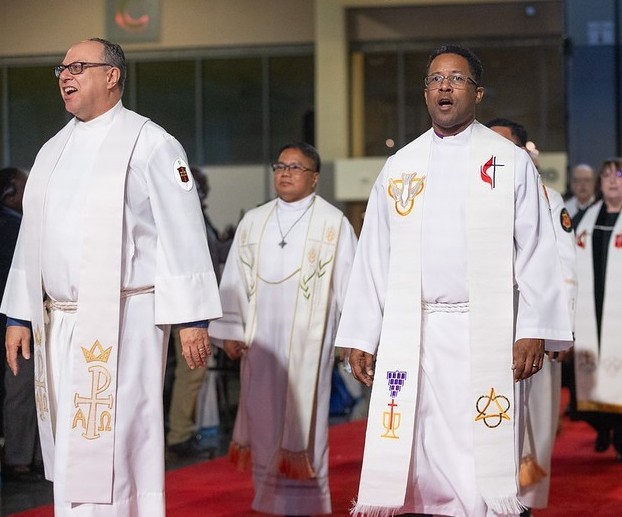
Bishops Dan Schwerin and Cedrick Bridgeforth process with their colleagues at the opening worship service on April 23.
Among the delegates are those who are part of conservative unofficial caucus groups, such as the Wesley Covenant Association and Good News, some members of which had a voice in starting a new denomination, the Global Methodist Church. These groups have advocated for strengthening the enforcement of restrictions on people who identify as LBGTQ, re-opening the church disaffiliation option, and opposing regionalization of the UMC.
“Attempts have and likely are being made to organize people who have no intention to be in the room long term but are, for some reason, reveling in the thought that perhaps they can make one last parting jab before their exit,” Bishop Bickerton said at the Council of Bishops meeting on April 17 (as reported by UM News Service).
In his invitation to the communion table on Tuesday morning, Bishop Bickerton said, “However you have been created and however you choose to express yourself, you are welcome."
Some delegates noted that no deacons were assisting at the communion table, despite the description in the Book of Discipline and instructions in the denomination’s statement on communion, This Holy Mystery.
Read more about opening worship
Absent delegates
Some elected delegates could not make it to General Conference because they could not get visas or passports to travel out of their country. Others had died or left the denomination since they were elected. Some delegates questioned whether the conference secretary, Gary Graves, and his assistants, did enough to try to overcome the international travel obstacles. The Committee on Credentials investigated this and reported being satisfied that Graves did everything possible to resolve these problems. Delegates asked Graves to report back to them on the specific steps he took.
'Pathway to our next expression'
A group consisting of bishops (including Bishop Tracy Smith Malone) and others prompted delegates to imagine a United Methodist Church that adapts to change. The recommended budget for the UMC for the next four years calls for an approximately 50% reduction. A significant number of church disaffiliations have reduced the size of the denomination. The role of churches in U.S. society has receded drastically. These and other challenges mean that the UMC should reconsider its structure and motivation. “We must move from reaction to revitalization, from what we have been to who God wants us to be,” the group said in their report on April 24.
Austere budget recommendation
The General Council on Finance and Administration is recommending a denominational budget that is approximately half the size as the previous budget (passed in 2016). Apportionment receipts have decreased due to disaffiliations, stresses on attendance due to COVID, increasing ministry costs for churches, among other factors. Most boards and agencies would have their budgets halved, except for the General Commission on Religion and Race and the General Commission on the Status and Role of Women, whose budgets would but cut by 1%. The budget comes up for vote next week. Read more about the budget recommendation
A regionally adaptable Book of Discipline
The 2016 Discipline calls for a General Book of Discipline, which would retain certain parts of the Discipline for all geographical regions of the church, while allowing others to be adaptable by each region (without needing General Conference approval). Currently, only Central Conferences (outside the U.S.) can adapt the Discipline for their contexts. The Standing Committee on Central Conference Affairs, which was assigned the task of recommending a plan for ordering and changing the Discipline for this purpose, invited the delegates to read and discuss their recommendation and report their responses to the SCCCA. Read more (scroll down on the page)
Legislative Committees
NIC delegate Rev. Alka Lyall was elected secretary for the Faith and Order Committee and Lonnie Chafin is chairing the Conferences Committee. Rev. Luis Reyes is chair of a subcommittee in Higher Education and Superintendency. Other legislative committee assignments: Rev. Gregory Gross, Administration; Rita Smith, Judicial Administration; Nadia Kanhai, Church and Society. These committees consider petitions submitted for changes in paragraphs assigned to them. They may amend any of the petitions. They recommend a voting action to the General Conference delegates.
General Agency elections
Rev. Dr. Carol Noren (retired elder) was elected to the General Commission on Archives and History.
A fire briefly burned in Movement in the City’s (new faith community) Melrose Park campus this morning. Firefighters, who rushed from a nearby station, quickly extinguished the…
Christ United Methodist Church in Rockford suffered a fire on Monday night, Feb. 23, that started in its organ. Thanks to the fast response of the few in the building at the time, d…
For nearly a century, housing has been part of Humboldt Park United Methodist Church’s ministry. Now, through a partnership with LUCHA, the church’s 98-year-old building is being tran…
Reflecting on scripture and Building Beloved Community, Bishop Dan Schwerin contrasts God’s love-shaped authority with the fear-driven authoritarianism se…